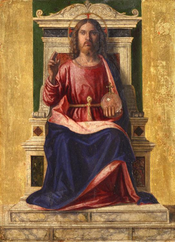| Revision as of 18:22, 6 May 2013 edit90.199.141.230 (talk) It surely needs a citation that no Polytheistic faith has ever claimed exclusivity.← Previous edit | Revision as of 20:23, 6 May 2013 edit undoAnomieBOT (talk | contribs)Bots6,557,264 editsm Dating maintenance tags: {{Fact}}Next edit → | ||
| Line 2: | Line 2: | ||
| {{salvation}} | {{salvation}} | ||
| The concept of a '''one true faith''', '''one true religion''', or '''one true church''', stems from the ] belief in the "one true God"{{fact}}, which implies a degree of ]. The claim that one faith is true, and that by implication other religions are false, is based upon the claim that God has spoken to mankind through a revelation intended for all, revealing the will of the divinity{{fact}}. | The concept of a '''one true faith''', '''one true religion''', or '''one true church''', stems from the ] belief in the "one true God"{{fact|date=May 2013}}, which implies a degree of ]. The claim that one faith is true, and that by implication other religions are false, is based upon the claim that God has spoken to mankind through a revelation intended for all, revealing the will of the divinity{{fact|date=May 2013}}. | ||
| The concept of "one true faith" is also based on the basic philosophical law known as the ]: two propositions that contradict each other cannot both be true. Therefore, various religious traditions offering contradictory doctrines cannot be affirmed as equally true. | The concept of "one true faith" is also based on the basic philosophical law known as the ]: two propositions that contradict each other cannot both be true. Therefore, various religious traditions offering contradictory doctrines cannot be affirmed as equally true. | ||
Revision as of 20:23, 6 May 2013
| This article needs additional citations for verification. Please help improve this article by adding citations to reliable sources. Unsourced material may be challenged and removed. Find sources: "One true faith" – news · newspapers · books · scholar · JSTOR (March 2011) (Learn how and when to remove this message) |
| Part of a series on |
| Salvation in Christianity |
|---|
 |
| General concepts |
| Particular concepts |
| Punishment |
| Reward |
The concept of a one true faith, one true religion, or one true church, stems from the monotheistic belief in the "one true God", which implies a degree of exclusivism. The claim that one faith is true, and that by implication other religions are false, is based upon the claim that God has spoken to mankind through a revelation intended for all, revealing the will of the divinity.
The concept of "one true faith" is also based on the basic philosophical law known as the law of noncontradiction: two propositions that contradict each other cannot both be true. Therefore, various religious traditions offering contradictory doctrines cannot be affirmed as equally true.
Christianity
Main article: One true churchThe claim to be the one true church is related to the first of the Four Marks of the Church mentioned in the Nicene Creed: "one, holy, catholic, and apostolic church". Some Christian churches claim to be the one true church while others claim only to be part of the one true church.
Islam
Islam is the monotheistic religion articulated by the Qur’an, a text considered by its adherents to be the verbatim word of God (Template:Lang-ar, Allah), and the teachings and normative example (called the Sunnah and Hadith) of Muhammad, believed by Muslims to be the final Prophet of Islam, the Seal of the Prophets.
Muslims believe that God is absolutely singular and absolutely transcendent, the doctrine of tawhid. Muslims also believe that Islam is the original and primordial faith, or fitrah, that was revealed at many times and places before, including through, by co-option, the prophets of other religions, including Ibrahim (Abraham), Musa (Moses) and 'Isa (Jesus). Muslims maintain that previous messages and revelations such the Bible and the Gospel were revealed for a specific time period and specific people and have become corrupted over time, and no longer remain 100% authentic viable revelation but consider the Qur'an to be both unaltered and the final revelation from God. Religious concepts and practices include the five pillars of Islam, which are basic concepts and obligatory acts of worship, and following Islamic law, which touches on virtually every aspect of life and society, encompassing everything from banking and welfare, to warfare and the environment.
Judaism
Jews believe that the God of Abraham is the one true God. The Jews believe the God of Abraham entered into a special relationship with the ancient Israelites, marking them as his Chosen People, giving them a mission to spread the concept of monotheism. Jews do not consider their chosenness to be a mark of superiority to other nations, but a responsibility to be an example of behavior for other nations to emulate.
See also
References
- * Quran 51:56
- "God". Islam: Empire of Faith. PBS. Retrieved 2010-12-18.
For Muslims, God is unique and without equal.
- "God". Islam: Empire of Faith. PBS. Retrieved 2010-12-18.
- "People of the Book". Islam: Empire of Faith. PBS. Retrieved 2010-12-18.
- Accad (2003): According to Ibn Taymiya, although only some Muslims accept the textual veracity of the entire Bible, most Muslims will grant the veracity of most of it.
- Esposito (1998), pp.6,12
- Esposito (2002b), pp.4–5
- F. E. Peters (2003), p.9
- F. Buhl. "Muhammad". Encyclopaedia of Islam Online.
{{cite encyclopedia}}: Unknown parameter|coauthors=ignored (|author=suggested) (help) - Hava Lazarus-Yafeh. "Tahrif". Encyclopaedia of Islam Online.
- Esposito (2002b), p.17
- Esposito (2002b), pp.111, 112, 118
- "Shari'ah". Encyclopædia Britannica Online.
- "What Does It Mean For Jews to Be the Chosen People?" Pelaia, Ariela.